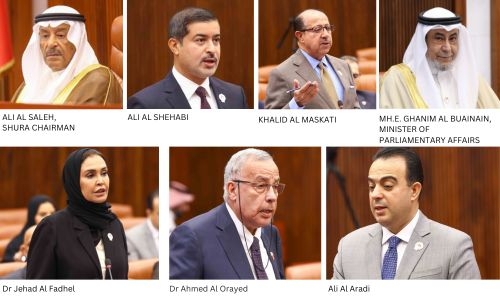Shura Council votes to uphold law limiting expat wives’ business rights amid calls for reform
TDT | Manama
Email: mail@newsofbahrain.com
A contentious 37-year-old law requiring Bahraini husbands’ approval for their expat wives’ business ventures survived a Shura Council vote yesterday, with the chairman’s tie-breaking decision ensuring the rule remains in place despite growing calls for reform to reflect Bahrain’s modern economic vision.
The rule permits husbands to prevent or revoke their wives’ ability to trade. Supporters of its repeal argued the restriction clashes with Bahrain’s progress on gender equality and economic development.
“This law has been in place for nearly four decades and no longer suits Bahrain’s economic aspirations,” said Khalid Al Maskati, Chairman of the Fi-nancial and Economic Affairs Committee. “It is time foreign wives were allowed to contribute freely to the economy without unnecessary interference.”
The debate over the proposal revealed stark divisions among council members.
Repeal
Lina Habib Qassim spoke passionately in support of the repeal. “Bahrain’s women have gone beyond empowerment and are now leaders in their fields. It is unfair to keep rules that stop them from trading equally, even if they happen to be foreign wives,” she said. Opponents questioned the relevance of the proposal. Ali Al Shehabi argued, “Foreign wives come to Bahrain as spouses, not business owners. Economic programmes should focus on supporting Bahraini women.”
Complications
He also warned of potential complications.
“Removing this rule risks creating conflicts with the countries these foreign wives originally come from,” he added.
Ali Al Aradi felt the law was being misrepresented. “The current law does not stop foreign wives from working or engaging in business in Bahrain. The restrictions are tied to agreements within the marriage, not imposed by the state,” he explained.
Findings
He also criticised the committee’s findings.
“The report doesn’t provide enough evidence to justify this change. It should be reconsidered,” he said, calling for the proposal to be withdrawn for further review.
Dr Ahmed Al Oraiyed questioned the need for change.
“What problem is this trying to solve?” he asked. “There are no reports of foreign wives facing difficulties under the current system. Many Bahrainis married to foreign women operate businesses without any trouble.”
Concerns
Ali bin Saleh Al Saleh, Chairman of the Shura Council, echoed these concerns, raising doubts about the quality of the committee’s report.
“The Financial and Economic Affairs Committee is known for its thorough reports, but that cannot be said for this one,” he remarked. While recognising the good intentions behind the proposal, Al Saleh defended the inclusion of Article 14 in the law. “This provision was not added without thought. Those who drafted it provided clear reasoning for its purpose,” he said.
Consequences
He also warned of unintended consequences.
“Rather than advancing fairness for women, this change risks undermining their rights. It is a matter that needs deeper consideration,” he stressed.
Minister of Parliamentary Affairs HE Ghanim Al Buainain added a legal perspective, emphasising that Bahrain’s laws on civil and commercial matters involving foreign elements are clear.
“The law governing the legal capacity and personal status of individuals is determined by the state to which they belong,” he explained. “This principle is reflected in Article 14, and there is no issue of discrimination between men and women when it comes to engaging in trade or requiring consent.”
Example
Buainain also pointed to Article 22 of the UAE’s laws, which the committee referenced in their proposal, as an example.
“The UAE law allows non-citizens to engage in trade, but only under specific conditions and within limits set by the Cabinet based on recommendations from the Minister of Economy,” he said. He called for the proposal to be sent back to the committee for further review, suggesting that related laws, such as Bahrain’s Civil and Commercial Procedures Law, also be considered. “There are several issues with this proposal that need to be addressed in depth,” he concluded.
Fairness
Second Deputy Chairperson Dr Jehad Al Fadhel linked the discussion to broader efforts in Bahrain to ensure fairness in financial and legal matters.
“Islamic law has always protected financial independence for both men and women, and Bahrain has built on this foundation to advance equality,” she said. Dr Al Fadhel also pointed to examples from other countries. “We’ve seen this change implemented elsewhere, and Bahrain has often led in adopting forward-thinking reforms,” she added.
Caution
Jamal Fakhro, First Deputy Chairman, urged caution.
“This is just the beginning of the discussion. If the proposal moves forward, it will return to us after the government has addressed the details and clarified any outstanding questions,” he said.
Inclusion
While the proposal was rejected, it has revived discussions about Bahrain’s legal framework and how well it aligns with the kingdom’s aspirations for progress and inclusivity.
“We cannot let outdated laws hold us back,” said Al Maskati. “Article 15 remains in place, setting conditions for business registration, but it is clear that Bahrain must continue refining its legal framework to match the realities of today’s economy.”
Related Posts

